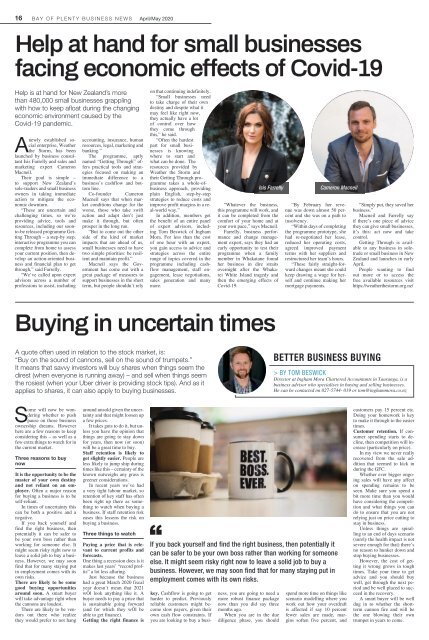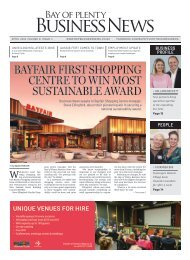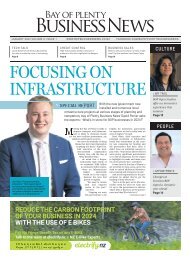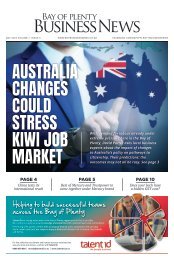April/May 2020 - BAY OF PLENTY BUSINESS NEWS
From mid-2016 Bay of Plenty businesses have a new voice, Bay of Plenty Business News. This new publication reflects the region’s growth and importance as part of the wider central North Island economy.
From mid-2016 Bay of Plenty businesses have a new voice, Bay of Plenty Business News. This new publication reflects the region’s growth and importance as part of the wider central North Island economy.
Create successful ePaper yourself
Turn your PDF publications into a flip-book with our unique Google optimized e-Paper software.
16 <strong>BAY</strong> <strong>OF</strong> <strong>PLENTY</strong> <strong>BUSINESS</strong> <strong>NEWS</strong> <strong>April</strong>/<strong>May</strong> <strong>2020</strong><br />
Help at hand for small businesses<br />
facing economic effects of Covid-19<br />
Help is at hand for New Zealand’s more<br />
than 480,000 small businesses grappling<br />
with how to keep afloat during the changing<br />
economic environment caused by the<br />
Covid-19 pandemic.<br />
A<br />
newly established social<br />
enterprise, Weather<br />
the Storm, has been<br />
launched by business consultant<br />
Isis Farrelly and sales and<br />
marketing expert Cameron<br />
Macneil.<br />
Their goal is simple –<br />
to support New Zealand’s<br />
sole-traders and small business<br />
owners in taking immediate<br />
action to mitigate the economic<br />
downturn.<br />
“These are uncertain and<br />
challenging times, so we’re<br />
providing advice, tools and<br />
resources, including our soonto-be<br />
released programme Getting<br />
Through – a step-by step,<br />
interactive programme you can<br />
complete from home to assess<br />
your current position, then develop<br />
an action-oriented business<br />
and financial plan to get<br />
through,” said Farrelly.<br />
“We’ve called upon expert<br />
advisors across a number of<br />
professions to assist, including<br />
accounting, insurance, human<br />
resources, legal, marketing and<br />
banking.”<br />
The programme, aptly<br />
named “Getting Through” offers<br />
practical tools and strategies<br />
focused on making an<br />
immediate difference to a<br />
business’s cashflow and bottom<br />
line.<br />
Co-founder Cameron<br />
Macneil says that when market<br />
conditions change for the<br />
worse, those who take swift<br />
action and adapt don’t just<br />
make it through, but often<br />
prosper in the long run.<br />
“But to come out the other<br />
side of the kind of market<br />
impacts that are ahead of us,<br />
small businesses need to have<br />
two simple priorities: be resilient<br />
and maintain profit.”<br />
Macneil says the Government<br />
has come out with a<br />
great package of measures to<br />
support businesses in the short<br />
term, but people shouldn’t rely<br />
on that continuing indefinitely.<br />
“Small businesses need<br />
to take charge of their own<br />
destiny and despite what it<br />
may feel like right now,<br />
they actually have a lot<br />
of control over how<br />
they come through<br />
this,” he said.<br />
“Often the hardest<br />
part for small businesses<br />
is knowing<br />
where to start and<br />
what can be done. The<br />
resources provided by<br />
Weather the Storm and<br />
their Getting Through programme<br />
takes a whole-ofbusiness<br />
approach, providing<br />
plain English, step-by-step<br />
strategies to reduce costs and<br />
improve profit margins in a real-world<br />
way.”<br />
In addition, members get<br />
the benefit of an entire panel<br />
of expert advisors, including<br />
Tom Beswick of Ingham<br />
Mora. For less than the cost<br />
of one hour with an expert,<br />
you gain access to advice and<br />
strategies across the entire<br />
range of topics covered in the<br />
programme including cashflow<br />
management, staff engagement,<br />
lease negotiations,<br />
sales generation and many<br />
more.<br />
Isis Farrelly<br />
“Whatever the business,<br />
this programme will work, and<br />
it can be completed from the<br />
comfort of your home and at<br />
your own pace,” says Macneil.<br />
Farrelly, business performance<br />
and change management<br />
expert, says they had an<br />
early opportunity to test their<br />
programme when a family<br />
member in Whakatane found<br />
her business in dire straits<br />
overnight after the Whakarei<br />
White Island tragedy and<br />
then the emerging effects of<br />
Covid-19.<br />
Cameron Macneil<br />
“By February her revenue<br />
was down almost 50 percent<br />
and she was on a path to<br />
insolvency.<br />
“Within days of completing<br />
the programme prototype, she<br />
had re-negotiated her lease,<br />
reduced her operating costs,<br />
agreed improved payment<br />
terms with her suppliers and<br />
restructured her team’s hours.<br />
“These fairly straight-forward<br />
changes meant she could<br />
keep drawing a wage for herself<br />
and continue making her<br />
mortgage payments.<br />
“Simply put, they saved her<br />
business.”<br />
Macneil and Farrelly say<br />
if there’s one piece of advice<br />
they can give small businesses,<br />
it’s this: act now and take<br />
control.<br />
Getting Through is available<br />
to any business in soletrade<br />
or small business in New<br />
Zealand and launches in early<br />
<strong>April</strong>.<br />
People wanting to find<br />
out more or to access the<br />
free available resources visit<br />
https://weatherthestorm.org.nz/<br />
Buying in uncertain times<br />
A quote often used in relation to the stock market, is:<br />
“Buy on the sound of cannons, sell on the sound of trumpets.”<br />
It means that savvy investors will buy shares when things seem the<br />
direst (when everyone is running away) – and sell when things seem<br />
the rosiest (when your Uber driver is providing stock tips). And as it<br />
applies to shares, it can also apply to buying businesses.<br />
BETTER <strong>BUSINESS</strong> BUYING<br />
> BY TOM BESWICK<br />
Director at Ingham Mora Chartered Accountants in Tauranga, is a<br />
business advisor who specialises in buying and selling businesses.<br />
He can be contacted on 027-5744- 019 or tom@inghammora.co.nz<br />
Some will now be wondering<br />
whether to push<br />
pause on those business<br />
ownership dreams. However<br />
here are a few reasons to keep<br />
considering this – as well as a<br />
few extra things to watch for in<br />
the current market.<br />
Three reasons to buy<br />
now<br />
It is the opportunity to be the<br />
master of your own destiny<br />
and not reliant on an employer.<br />
Often a major reason<br />
for buying a business is to be<br />
self-reliant.<br />
In times of uncertainty this<br />
can be both a positive and a<br />
negative.<br />
If you back yourself and<br />
find the right business, then<br />
potentially it can be safer to<br />
be your own boss rather than<br />
working for someone else. It<br />
might seem risky right now to<br />
leave a solid job to buy a business.<br />
However, we may soon<br />
find that for many staying put<br />
in employment comes with its<br />
own risks.<br />
There are likely to be some<br />
good buying opportunities<br />
around soon. A smart buyer<br />
will take advantage right when<br />
the cannons are loudest.<br />
There are likely to be vendors<br />
out there who realize<br />
they would prefer to not hang<br />
around unsold given the uncertainty<br />
and that might loosen up<br />
a few prices.<br />
It takes guts to do it, but unless<br />
you have the opinion that<br />
things are going to stay down<br />
for years, then now (or soon)<br />
will be a great time to buy.<br />
Staff retention is likely to<br />
get slightly easier. People are<br />
less likely to jump ship during<br />
times like this – certainty of the<br />
known outweighs any grass is<br />
greener considerations.<br />
In recent years we’ve had<br />
a very tight labour market, so<br />
retention of key staff has often<br />
been right up there as something<br />
to watch when buying a<br />
business. If staff retention risk<br />
eases this lessens the risk on<br />
buying a business.<br />
Three things to watch<br />
Paying a price that is relevant<br />
to current profits and<br />
forecasts.<br />
One thing a recession does is it<br />
makes last years’ “record profits”<br />
a lot less alluring.<br />
Just because the business<br />
had a great March <strong>2020</strong> fiscal<br />
year doesn’t mean that 2021<br />
will look anything like it. A<br />
buyer needs to pay a price that<br />
is sustainable going forward<br />
(and for which they will be<br />
able to get finance).<br />
Getting the right finance is<br />
If you back yourself and find the right business, then potentially it<br />
can be safer to be your own boss rather than working for someone<br />
else. It might seem risky right now to leave a solid job to buy a<br />
business. However, we may soon find that for many staying put in<br />
employment comes with its own risks.<br />
key. Cashflow is going to get<br />
harder to predict. Previously<br />
reliable customers might become<br />
slow payers, given their<br />
own cash flow constraints. If<br />
you are looking to buy a business,<br />
you are going to need a<br />
more robust finance package<br />
now than you did say three<br />
months ago.<br />
When you are in the due<br />
diligence phase, you should<br />
spend more time on things like<br />
scenario modelling where you<br />
work out how your overdraft<br />
is affected if say 10 percent<br />
fewer sales are made, margins<br />
soften five percent, and<br />
customers pay 15 percent etc.<br />
Doing your homework is key<br />
to make it through to the easier<br />
times.<br />
Customer retention. If consumer<br />
spending starts to decline,<br />
then competition will increase<br />
(particularly on price).<br />
In my view we never really<br />
recovered from the sale addition<br />
that seemed to kick in<br />
during the GFC.<br />
Whether ever bigger ongoing<br />
sales will have any affect<br />
on spending remains to be<br />
seen. Make sure you spend a<br />
bit more time than you would<br />
have considering the competition<br />
and what things you can<br />
do to ensure that you are not<br />
relying just on price cutting to<br />
stay in business.<br />
Unless things are spiralling<br />
to an end of days scenario<br />
(surely the health impact is not<br />
severe enough for that) there’s<br />
no reason to hunker down and<br />
stop buying businesses.<br />
However, the cost of getting<br />
it wrong grows in tough<br />
times. Take your time to get<br />
advice and you should buy<br />
well, get through the next period<br />
and be well placed to succeed<br />
in the recovery.<br />
A smart buyer will be well<br />
dug in to whether the shortterm<br />
cannon fire and will be<br />
the one blowing their own<br />
trumpet in years to come.

















